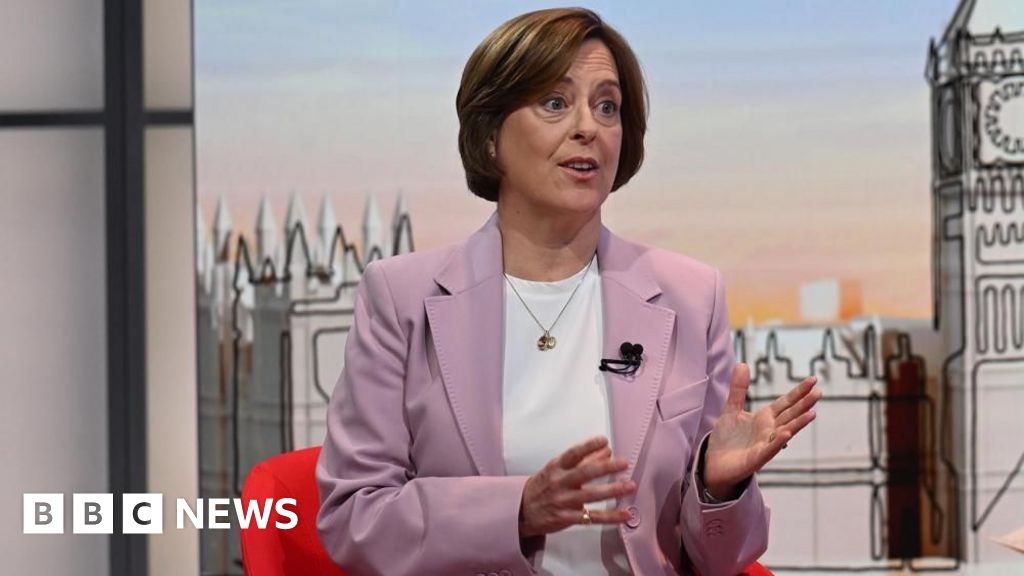needs to get a grip quicker after controversies, Ofcom chief says

Ofcom Chief Urges BBC to Act Faster on Controversies Following Glastonbury and Gaza Broadcasts
The BBC needs to address controversies "quicker" to avoid eroding public trust, according to Ofcom Chief Executive Dame Melanie Dawes. Her comments follow criticism of the corporation's handling of the broadcast of Bob Vylan's performance at Glastonbury and the withdrawal of a documentary about Gaza. Dawes expressed concern that delays in addressing these issues could lead to a "loss of confidence" in the BBC.
"Own Goals" and Eroding Trust
Speaking on the BBC's Sunday With Laura Kuenssberg programme, Dame Melanie highlighted the "own goals" the BBC had scored with the Gaza documentary and the Glastonbury coverage. The Gaza documentary, Gaza: How to Survive a Warzone, was pulled after a connection between its 13-year-old narrator and Hamas surfaced. At Glastonbury, punk-rap duo Bob Vylan led chants of "death, death to the IDF [Israel Defence Forces]" and made other controversial remarks. The BBC issued an apology for the Glastonbury incident, particularly to the Jewish community, and promised to take action.
"It's very frustrating that the BBC has had some own goals in this area," Dame Melanie said. "It does start to erode public trust and confidence." She added that the time it takes for the BBC to acknowledge and address issues is a major concern. "When these things go wrong it can take a long time for the BBC to see that something's happened when everybody else was there within a matter of hours."
Reports and Investigations Pending
Reports into both the Gaza documentary and the Bob Vylan performance are expected to be published soon. The review of the Gaza documentary is due to be released next week, according to Dawes. A BBC spokesperson stated that the findings will be published as soon as possible, emphasizing the need for a "thorough and proper process." The BBC is also facing scrutiny from the Commons culture, media and sport committee, which has requested an explanation by July 14 regarding broadcast delays, staffing, decision-making, contingency plans, and the next steps following the Bob Vylan incident.
Following the Glastonbury incident, the BBC announced it would no longer broadcast live performances deemed "high risk." Reports also suggested that the director of music, Lorna Clarke, stepped back from her day-to-day duties.
Expert Perspective: The Challenges of Live Broadcasting
Dr. Sarah Jones, a media ethics professor at the University of Cardiff, notes the inherent difficulties in live broadcasting. "Live events are unpredictable, and broadcasters must balance spontaneity with editorial responsibility," she explains. "The Bob Vylan incident highlights the challenges of pre-emptive censorship versus allowing artists freedom of expression. The key lies in robust pre-broadcast risk assessments and clear protocols for handling unforeseen issues."
Historical Context: BBC and Impartiality
The BBC's commitment to impartiality has been a cornerstone of its public service remit since its inception. However, the corporation has faced numerous challenges in maintaining this standard throughout its history. From accusations of bias during the Suez Crisis to more recent debates surrounding Brexit coverage, the BBC has consistently been under scrutiny. These controversies underscore the ongoing tension between the BBC's duty to inform and its obligation to remain neutral.
Political Reactions and Calls for Action
Transport Secretary Heidi Alexander echoed Dame Melanie's concerns, stating that the BBC needs "to do a rapid investigation of what has happened in relation to the Glastonbury incident." Shadow home secretary Chris Philp went further, suggesting that the BBC should be prosecuted for broadcasting the Bob Vylan footage, accusing the duo of "inciting violence and hatred."
“There should be an investigation and if, in the police's opinion, the Crown Prosecution Service's opinion, there is a reasonable prospect of conviction then it should be taken to court," Philp said.
Looking Ahead: Maintaining Public Confidence
Dame Melanie emphasized the importance of the BBC addressing these issues promptly to maintain public confidence. "The [BBC] Board and senior team need to get a bit quicker at recognising when something has gone wrong and get a grip of the actions that they need to take or there is going to be a real risk that the BBC loses confidence in what it delivers for the public."
The coming weeks will be crucial for the BBC as it releases the report on the Gaza documentary and addresses the questions raised about the Glastonbury coverage. How the corporation responds to these challenges will likely have a significant impact on its reputation and its relationship with the public.
Related Developments
Police launch criminal investigation into Bob Vylan and Kneecap Glastonbury sets. Bob Vylan dropped from Manchester music festival. Starmer criticises 'appalling' Bob Vylan IDF chants. Chief rabbi attacks BBC for airing 'vile Jew hate' at Glastonbury.
Originally sourced from: BBC Entertainment
